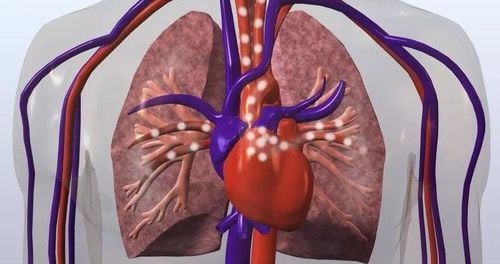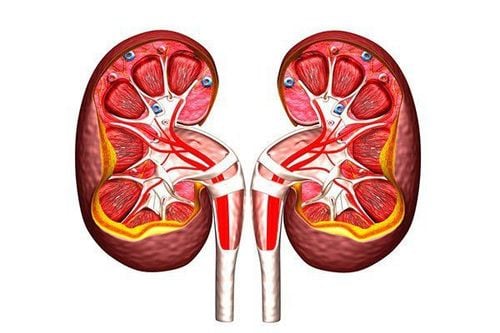This is an automatically translated article.
Lupus erythematosus is a long-term condition that causes inflammation of the joints, skin, and other organs. Lupus erythematosus is a chronic disease with no cure, but symptoms can improve with early diagnosis and treatment.
1. What is lupus erythematosus?
Lupus is a systemic autoimmune disease that occurs when your immune system attacks your own tissues and organs. Inflammation caused by lupus can affect many different body systems — including joints, skin, kidneys, blood cells, brain, heart, and lungs. Lupus erythematosus affects mainly the skin. A red, round rash that may appear on the skin or on the face, scalp, or elsewhere may change color. The rash caused by lupus erythematosus often leaves scars or patches of light skin after it heals.
SLE is difficult to diagnose because its signs and symptoms are often quite similar to those of other diseases. The most distinctive sign of lupus erythematosus is a rash on the face, which can occur in many but not all lupus cases.
Some people are born with a predisposition to develop lupus, this could be due to an infection, certain medications, or even sunlight. There is currently no cure for lupus erythematosus, which is a chronic disease, but treatments for the disease can help control the effects of the disease's symptoms.

Lupus ban đỏ là bệnh mãn tính
2. Is lupus erythematosus contagious?
Lupus is not contagious because it cannot be spread to others. You can't get lupus from contact with other people - even with very close contact or sex. The specific cause of lupus erythematosus is currently unknown, but genetic factors (HLA type, regulatory genes) and gene-environment interactions (UV exposure, immune system response to bacteria or viruses) drugs) has been identified as the cause of autoimmune disease.
Lupus erythematosus affects nearly 1.5 million Americans. The disease progresses when your immune system fails to match and attacks tissues such as joints, skin, kidneys, lungs, and heart. This attack will lead to inflammation and possibly damage to these organs.
Lupus is not spread from person to person. However, for those with the disease, disease manifestations and severity can increase in intensity and location over time.
3. Complications of lupus erythematosus
Inflammation caused by lupus erythematosus can affect many organs in the body, including:
Kidneys: Lupus can cause serious kidney damage and kidney failure is one of the leading causes of death in people with lupus erythematosus. Brain and central nervous system: If your brain is affected by lupus, you'll likely experience headaches, dizziness, behavioral changes, vision problems, and even a stroke or seizure. . Many people with lupus have memory problems and may have trouble expressing their thoughts. Blood and blood vessels: Lupus can lead to blood problems, including anemia and an increased risk of bleeding or clotting. It can also cause inflammation of the blood vessels. Lungs: Having lupus erythematosus increases your chance of getting an inflammation of the lining of your chest cavity (pleurisy), making it hard to breathe. Pulmonary bleeding and pneumonia may also occur. Heart: Lupus erythematosus can cause inflammation of the heart muscle, arteries, or pericardium (pericarditis). The risk of cardiovascular disease and heart attack is also greatly increased.

Lupus ban đỏ gây viêm nhiễm làm tăng nguy cơ mắc các bệnh tim mạch
Having lupus also increases your risk of the following:
Infection: People with lupus are more susceptible to infections because both the disease and its treatments can weaken the immune system. Cancer: Having lupus can increase your risk of cancer; however the risk here is quite small Avascular necrosis: This occurs when the blood supply to the bone gradually decreases, often resulting in small breaks in the bone and eventually the bone cells begin to die makes bones easy to break. The joint surface is often destroyed if avascular necrosis is proximal to the joint. Pregnancy complications: Women with lupus have an increased risk of miscarriage. Lupus increases the risk of high blood pressure during pregnancy (pre-eclampsia) and premature delivery. To reduce the risk of these complications, doctors often recommend delaying pregnancy until the disease has been under control for at least six months.
4. How to diagnose Lupus erythematosus
Because the symptoms of lupus erythematosus can resemble many other conditions, it can take some time to get an accurate diagnosis. Your doctor will order some blood tests. High levels of an antibody, combined with typical symptoms of the disease, means you have lupus.
You may also be ordered to have X-rays and scans of your heart, kidneys and other organs if your doctor thinks they are damaged.
Once diagnosed with lupus erythematosus, you will have regular checkups and tests, such as regular blood tests to check for anemia and urine tests to check for kidney problems , caused by lupus.
Severity caused by lupus erythematosus manifests from mild to severe:
Mild: The patient will feel tired and have joint and skin problems. Moderate: Several other organs are also inflamed, including the lungs, heart, and kidneys. Severity: The disease causes serious damage to the heart, lungs, brain or kidneys, and is life-threatening.

Lupus ban đỏ ở mức độ nhẹ chỉ gây ra các phát ban trên da
5. Can Lupus erythematosus be cured?
There is no cure for lupus erythematosus. However, there are now many different medications that can be used to relieve symptoms and control the disease. Treatments are often individualized by a specialist, such as a rheumatologist to address internal organ and joint problems, a dermatologist to address skin problems, or other conditions. other specialists depending on which organ system in the body is affected.
6. How to prevent lupus erythematosus
You can't avoid lupus, but you can prevent factors that cause symptoms, such as:
Limit your time in the sun if you're exposed to the sun. The sun causes a rash. You should always wear a sunscreen with an SPF of 70 or higher that blocks both UVA and UVB rays. Try to avoid using many medications, as they can make you more sensitive than sun exposure. These include the antibiotic minocycline (Minocin), trimethoprim-sulfamethoxazole (Bactrim), and diuretics such as furosemide (Lasix) or hydrochlorothiazide. Avoid stress: You should regularly meditate, do yoga or get a massage - anything that calms your mind, makes you feel more comfortable. Patients with lupus erythematosus should stay away from people with colds and other infections. Get enough sleep: you should go to bed early to ensure adequate sleep (7-9 hours). Vinmec International General Hospital with a system of modern facilities, medical equipment and a team of experts and doctors with many years of experience in medical examination and treatment, patients can rest assured to visit. and hospital treatment.
To register for examination and treatment at Vinmec International General Hospital, you can contact Vinmec Health System nationwide, or register online HERE.
References: healthline.com, mayoclinic.org, medicinenet.com, nhs.uk













